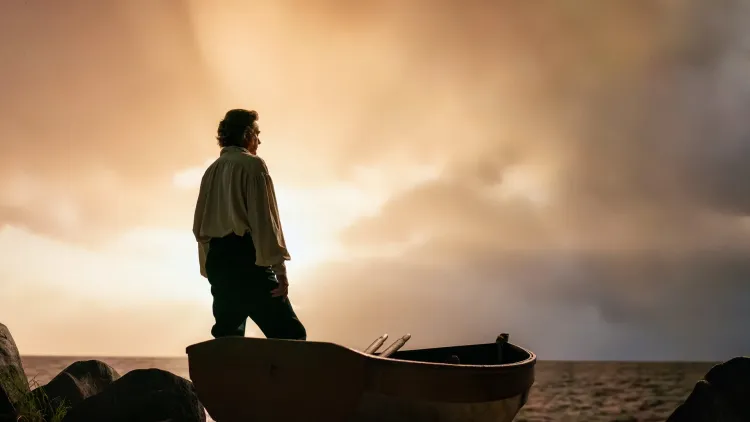A Chromosome

The Y chromosome looks insignificant when lined up next to the other chromosomes. It's a little nubbin of a thing, an afterthought that has nevertheless rewritten human history.
In actuality, most of its work is done in the womb, shaping the sex organs of babies assigned male at birth, a penis and testes and assorted other characteristics. The real work of masculinity is carried out by testosterone in adolescence, when it sweeps in and leaves behind a bigger, bulkier body, a deeper voice, hair everywhere, leaving some of us thrilled at the way our bodies seem to course with some new energy but leaving some of us flummoxed. The Y chromosome is mostly dormant for this. It's still there, but its work was completed long ago.
And yet the Y chromosome does its job all the same. It lets the doctor hold those of us who possess it and declare, with confidence, that it's a boy, based entirely on sight. It will change everything, something so insignificant.
I had almost forgotten the day this year, at least until I got the card from my parents. It's the anniversary of my adoption, the day that my parents signed the paperwork that made me legally their child. When I was young, we celebrated it every year with cupcakes, a shadow of my birthday cake but no less significant. Now that I am an adult, my parents have a tendency to remember it more consistently than my birthday. They always send an e-card that is heartfelt and pure. They are remembering what, for them, felt like a miracle, a series of complex accidents that brought a baby boy into their lives.
Here is the part where I'm supposed to say, "Actually, they adopted a baby girl! Oops." And that is true. I believe that is true with my whole heart. But at the same time, they adopted a baby with a Y chromosome. They adopted a baby a doctor called a boy. They adopted an imposter.
Most trans people are able to imagine a life where they were raised by their family as their true gender. It might have been worse or better or whatever, but at least it was true. Even if you are not trans, if you were raised by your biological parents, or even adoptive parents who adopted you at birth, you can more or less imagine a life where you were born as another gender and lived a different life but at least one with familiar parameters. You can almost walk the perimeter of that life. Can maybe measure its area.
I cannot do this. If I had been born a cisgender woman, everything would have been different.
The adoption agency that handled my adoption had very firm ideas about birth order, and they believed that the most rock-solid families boasted an older boy, then a younger girl, ideally with about three years as an age gap. They claimed to have research to back this up, but my suspicion, the older I've gotten, is that they were making it up out of whole cloth, in order to serve some strange vision of a family unit where the masculine was prioritized over the feminine.
But the larger point remains. Because of my Y chromosome, my biological mother was given profiles solely of childless families waiting for an older son. She chose my parents as one of her finalists from that batch, and the agency later completed the choice for her. I would never know the other families in her selection, nor the families who might have been handed to her had my outsides matched my insides.
This is what I can't escape: Had I been born a cisgender girl, had I not spent my life running away from what I knew to be true but didn't want to be true, I would have gone to an entirely different family. I would have been a second child. I would have been a little sister. I would have lived in some other part of the country or maybe even the world. I would never have known my parents, who would have adopted some other baby boy, perhaps one who was not an imposter. I would never have known my sister, my friends, my wife. My career would have been different. My life would have been different.
My mother, when I was young, liked to assure me in moments of existential angst that the world had worked out as it was supposed to. She believed, sincerely and with all her heart, that if my father and her had been able to conceive naturally, my sister and I would have been the result. She believed that in some cosmic sense, God was always knitting us together, that you could run 100 million million iterations of this universe, and he would always find a way to pull us together.
But in how many of those iterations was I trans? In how many of those iterations was a time bomb waiting to break my parents' hearts? In how many of those iterations was I made a plot twist by chromosome?
My wife wanted to watch the movie Eighth Grade tonight. It's a film I loved, but one I haven't been anxious to revisit. I hadn't quite pinned down why that was until I felt, deep in my gut, that I couldn't spend so long inside of the protagonist's head, because to do so would be to see some other life I hadn't led, realized with such acuity that I would ache from loss.
This is a common experience for trans people early in transition -- they begin to mourn the life they didn't lead, the "right" life that would have guided them through the hallmarks of first childhood, then adolescence, then young adulthood. I do this, too. I will never have a girlhood, and it stabs me in the heart every time I think about it. I mean, yes, it would have been as boring and occasionally awful as any childhood, but it would have been mine, rather than something that always felt like it happened to me.
But I can't imagine my girlhood to be a ghost haunting a familiar home and a familiar family, because that girl haunts different people. Right now, there are two other people, somewhere, who would have been my parents. There are friends I will never have, lovers I will never know. In Florida or Montana or Alaska or New York, there are people who miss me and don't even know enough to realize it. They are haunted not by a ghost, but by a vibration from another universe, and none of us know enough to feel that fear or that loss.
All because of a chromosome.
From the earliest days of my life, I imagined myself as a fictional character. It was a coping mechanism, I now realize, a decision I made at some point in childhood to invent a boy who was me but was also a better version of me, the hero of a story I would never get to see that could still entertain people in some other universe where my life was a novel or a television show. I wasn't a boy, but I could play one on TV.
Now, I am older, and I am a writer. I come up with fictional scenarios, grand and mundane. I could tell you everything you need to know about the characters in my latest TV show pitch, and I could expound for hours about my latest novel idea.
But my greatest fictional creation was always myself. My real life is over some other horizon, and the realization that I will never find it, will never see those faces, feels like the greatest loss I will ever know. I miss so many people I've never met, countless and shadowy, somewhere out there, waiting for another iteration of this universe that might pull us together at long last.
I am a transwoman or whatever. This is mostly a journal to myself, but you can read it if you want, because I feel like radical honesty is sometimes the best policy, and if I ever come out more widely, I can just, like, point my family to these mad ramblings. I'm obviously not named Emily Sandalwood, because lol, whose last name is Sandalwood? Anyway, you can respond to this, and I will look at your reply and nod sagely and probably never write back, or you can follow me on Twitter, where I am extremely funny.





Member discussion